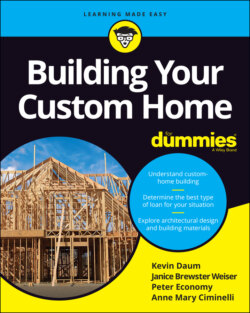Читать книгу Building Your Custom Home For Dummies - Peter Economy - Страница 14
Asking yourself about affordability
ОглавлениеOf course, you’ve heard horror stories about custom-home projects that have gone seriously over budget. They go over budget for many reasons, but usually the main culprit is that the homeowners didn’t spend enough time determining what they can afford. Obviously, if you’re building well below your means, going over budget is easily rectified by using your own cash. But running out of money is the number-one cause of custom-home disasters. Before you start the custom-home process, you seriously need to consider the following:
What can you physically pay? Take stock of your cash on hand, equity in real estate, and available cash from other resources. Make a firm decision on how much money you’re willing to put toward the project. Chapter 8 can be a big help. You also need to get a rough idea of how much borrowing power you have to help establish a limit for your budget when added to your available cash. Make sure you consult with a financial adviser. We provide tools and Kevin’s expert financing assessments in Chapters 9 and 10.
What can you emotionally pay? Just because you have the money and the borrowing power doesn’t mean you really want to spend it all. Think carefully and discuss with your spouse what your limits are for making payments and how much liquidity (cash) you need in the bank to help you sleep at night when all is said and done. Make sure you take into account tax deductions and interest earned on investments when analyzing your monthly cash flow. After you’ve found your emotional limit, you can design your project to fit your comfort zone.
What’s your cushion and tolerance for risk? As we say again and again throughout this book, building a custom home is a complex process. You need to consider many variables beyond your control and then realize that the project can go over budget even if you do everything right. You can certainly get good solid estimates, but ultimately you won’t know what this home will cost until it’s finished and you total up the receipts. Make sure you’ve addressed the “what if?” issues thoroughly. Talk about how you’ll cover things financially if the market turns sour — devaluing your property — or the cost of materials rise. Decide what safety money (such as your retirement fund) you’re willing or unwilling to tap into.
The more you talk about financial issues related to your custom-home project, the more likely you are to resolve problems before they happen. Optimism in a custom-home project can get you into trouble every time. The best approach is to examine every possible risk and make contingency plans for every potential problem.
